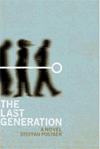Daughters of Bliss stare into the Abyss
August 28, 2020

You don’t envy your daughters or any young person. Their world seems vapid and idiotic – an endless slew of You Tubes and disappearing dick pics. You must explain almost every reference to the 20th century. They do not read for pleasure and barely for school. If it isn’t on their social media feeds they aren’t consuming it. Yet, you do envy their paradoxically thick skins. Their ability to “shake it off” was remarkable.
Moving through life’s minefield with ease you find breathtaking. Does a glib term like triggered render brutalities benign? For all the very real talk of bullying and its fatal consequences, maladjusted loners shooting up high schools, your children seem blissfully immune. If they are on the receiving or giving end of any such terrors you are unaware of it. Are they living sheltered lives? Undoubtedly. Will the real world punch them in their pretty faces soon enough? Probably. But that they are oblivious or even impervious is one hundred percent a fucking miracle.
Will amazing tune and big budget production get Millennials into the Toyota Corolla?
October 17, 2016
First things first. I love the song. Though recorded before I was born, Lesley Gore’s “You Don’t Own Me” is one of those rare tunes that transcends time. If the song came out tomorrow, sung by Adelle, it would be a smash hit. It’s that good. And it’s certainly the best thing about Toyota’s big budget, 60-second anthem for Corolla, which debuted recently. Because of this commercial, I’ve been singing the hero lyric, off and on now for several weeks. In that regard it’s indisputably memorable.
And yet something is the matter. The “creative algebra” doesn’t add up. Using a classic ballad of female empowerment for selling mainstream automobiles to Millennials is not enough to turn the trick. Showing assorted attractive young people engaging in mildly rebellious behavior isn’t enough either. Try as they do to appear otherwise, the cars seem incongruous to the lovely pictures and strong music. By definition most every commercial is fabricated reality but if it’s pushed too far the stink of bullshit corrupts the narrative. In my view that’s what’s happening here. The ad’s slip is showing.
Said another way, there’s nothing particularly interesting or provocative about these cars except for the fact that they’re in this commercial.
The ad is clearly targeting twenty-somethings and according to this article might actually be working. I’m suspicious about this data so soon after the commercial’s premier. Especially given my intuition points in another direction.
And then, just before posting, I saw another execution in the “You Don’t Own Me” campaign, a 30-second spot.
30 second version, with story…
The same great tune. Slick production values. But this time there’s a story. A young woman quits her job from an ornery chef (he can’t own her) and starts a food truck business. The Toyota Corolla gets her from point A to Point B. It’s a simple story but it is a story. And it made me like –maybe the better word is appreciate- the campaign. Stories will do that.
I haven’t enjoyed a Toyota commercial in ages. Compared to the white bread suburban approach the brand has maintained for eons, at least this musically powered approach –helped now I see by stories- has ambition. What do you think? Have I gone soft or was my original assessment accurate?
(Author’s note: I’m avail for copy, content creation & creative leadership: https://steffanwork.wordpress.com)



 The Happy Soul Industry
The Happy Soul Industry The Last Generation
The Last Generation